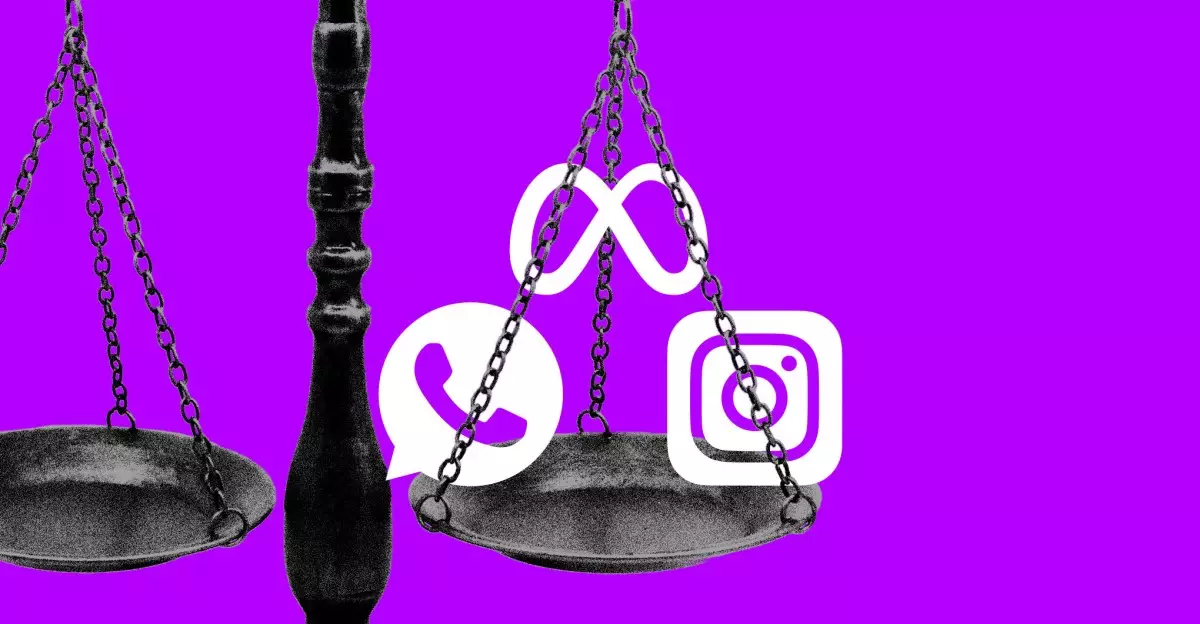The atmosphere in Washington, D.C., was charged with uncertainty as the trial against Meta unfolded, a case that not only scrutinizes the actions of tech behemoth Facebook but could also reshape the landscape of digital commerce and communication. At the center of it all stood Mark Zuckerberg, the bridge between a burgeoning digital kingdom and the adversarial forces of government regulation. The Federal Trade Commission (FTC) is not merely aiming to shake the foundations of Meta; it seeks to challenge the underlying paradigms of how tech giants acquire and manage their assets.
Mark Zuckerberg’s testimony, which spanned nearly 13 hours over three days, culminated in him not just defending previous multibillion-dollar acquisitions but expressing a sense of pride in these financial decisions. The government accused him of a “catch-and-kill” strategy designed to eliminate competition, particularly focusing on his purchase of WhatsApp and Instagram. Despite the gravity of the accusations, Zuckerberg stood firm, claiming his motives were rooted more in foresight and the intent to innovate rather than suppress competition.
A Complex Web of Acquisitions
Zuckerberg’s assertion that he would pay the hefty sum of $19 billion for WhatsApp again reflects a significant belief in the transformative power of communication technology. From his perspective, the anticipation of WhatsApp’s role in the evolving nature of online communication justified its price tag. He even admitted that there was a time when he thought it was “extremely unlikely” that WhatsApp would pose a meaningful threat to Facebook, given the co-founders’ disdain for advertising—one of the lifebloods of Meta’s revenue.
As conversations shift from public forums to private chat interfaces, Zuckerberg viewed WhatsApp not just as an acquisition but as a crucial leverage point against competitors like Apple and Google. The admission that he was “worried about them messing with us” places Meta’s move in the battleground of corporate warfare, where every acquisition can be positioned as a tactical response to protect market share and influence.
The Instagram Dilemma and Market Manipulation
The narrative around Instagram is yet another layer of complexity in this ongoing trial. Zuckerberg contended that he did not perceive Instagram as a threat until it approached the 1 billion user mark, which ironically also points to his greater caution in managing user engagement across platforms he owned. The directive to minimize integration between the platforms intended to prevent Instagram from cannibalizing Facebook’s audience further illustrates the growing tension between competition and cooperation, even within a single corporate structure.
Zuckerberg’s admission that he believed Instagram would not thrive independently raises questions. If he considered Instagram so fragile without Meta’s resources, how can the FTC accurately position this acquisition as an oppressive maneuver aimed at stifling competition? This contradiction adds a layer of ambiguity to the moral standpoint of Meta’s acquisitions and the FTC’s claims regarding anti-competitive practices.
Additionally, the testimony noted that both Instagram and WhatsApp have exceeded even Zuckerberg’s own ambitious expectations. WhatsApp now boasts almost 3 billion users, and Meta garners substantial revenue from it—proving that what began as potential purchases for suppressing competition transformed into colossal assets.
Sheryl Sandberg’s Testimony: A Reflection on Decisions
The trial took an interesting turn as former COO Sheryl Sandberg was called to testify. In a striking moment of reflection, she expressed that her prior concern about overpaying for Instagram was perhaps misguided. This kind of introspection emphasizes the unpredictable nature of tech investments. It’s a humbling reminder that even the experts cannot foresee how today’s decisions will shape tomorrow’s realities.
Her admission resonates with the often tumultuous journey tech companies endure in their quest for dominance in a rapidly changing digital landscape. It exposes a crucial truth: even the most powerful tech executives can misjudge their growing ecosystems, further blurring the lines of intentional strategy versus reactionary growth.
The Larger Implications of the Trial
As the FTC v. Meta trial continues to unfold, the world watches how this case will influence future tech acquisitions. Will this set a precedent that curbs the immense power that platforms like Meta wield? It serves as an essential chapter in the broader narrative of technological evolution, as regulators grapple with how to align innovation with ethical practices.
Whether Zuckerberg’s claims are ultimately validated or condemned, this legal battle raises profound questions about the nature of competition in tech. Are these high-stakes acquisitions safeguarding innovation, or are they merely strategies to reinforce monopolistic control? As such discussions evolve, the conversation surrounding anti-trust issues in technology will remain at the forefront, defining not just Meta’s future but the very essence of how technology interacts with societal expectations.


Leave a Reply